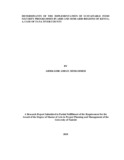| dc.description.abstract | This study was carried out in order to examine the determinants of the implementation of
sustainable food security programmes in arid and semi-arid regions of Kenya. The study was
guided by the following four research objectives: to examine the extent to which peace
building influences the implementation of sustainable food security programmes in arid and
semi-arid regions Kenya; to determine the influence of Education on the implementation of
sustainable food security programmes in arid and semi-arid regions of Kenya; to establish the
extent to which crop diversification influences the implementation of sustainable food security
programmes in arid and semi-arid regions of Kenya; and to assess the extent to which
integrated water management influences the implementation of sustainable food security
programmes in arid and semi-arid regions of Kenya. This study was guided by two theories i.e
the development theory and the post development theory. This study adopted a descriptive
survey design. The target population was 46, 123 farmers and 11 employees in the department
of agriculture at the county level. In this study, the sample size was calculated by use of the
Krejcie and Morgan table of 1970. A sample of 391 was used. The primary data from the field
was obtained by use of a questionnaire. Data was analyzed using Statistical Package for Social
Sciences (SPSS). The data was analyzed and presented using descriptive statistics such as
means and percentages, frequency counts, and standard deviations. The hypothesis
(relationship between the various variables) was obtained by use of the Chi-Square. Based on
the findings, the research concluded that peace building significantly influences the
availability, distribution and production of food thus enhancing food security. When there is
peace, communities are engaged in productive activities that can lead to food production thus
sustainability of the food security programme. Education is another major factor influencing
food security in the county. Well educated individuals are able to use modern methods of food
production, add value and use technology which in turn leads to sustainable food security.
Crop diversification influences the sustainability of food security programme in the county
significantly. This includes growing a variety of crops, intercropping, adoption of hybrid crops
and moving to horticultural agriculture. Finally, integrated water management influences the
sustainability of food security programme. This includes harvesting water during the rain
seasons, using modern technology in irrigation, exploring underground waters and preservation
of water catchment areas. | en_US |

